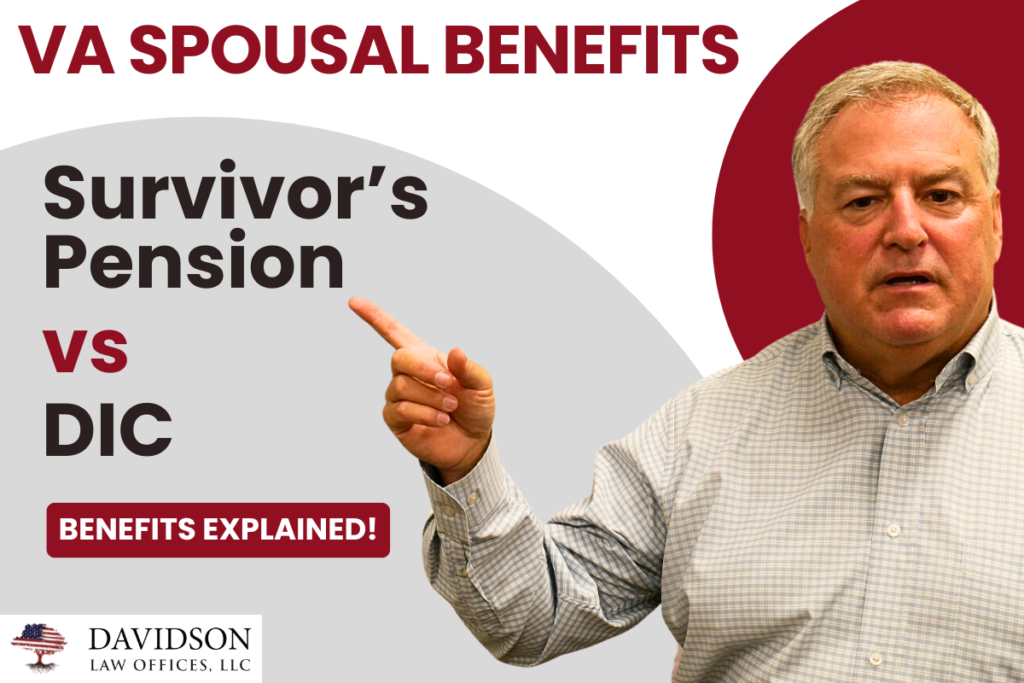Here I want to talk about two very important programs offered by the VA to help support the surviving spouses, dependents, and parents of veterans. If you’ve lost a loved one who served in the military, you’re already dealing with a lot of emotional and financial stress. The VA offers two key benefits to help alleviate some of that burden: Dependency and Indemnity Compensation (DIC) and Survivor’s Pension. These programs are designed to provide financial assistance to those who need it most, so let’s break down what they are, who qualifies, and how to apply.
What is Dependency and Indemnity Compensation (DIC)?
DIC is a tax-free monetary benefit paid to eligible survivors of service members who died while on active duty or as a result of a service-related injury or disease. This benefit is intended to provide financial support to the deceased veteran’s dependents, ensuring they have some level of financial stability after their loss.
Who is Eligible for DIC?
Eligibility for DIC hinges on the relationship you had with the deceased veteran and whether the veteran’s death was service-related. Here are the main criteria:
- Relationship: You must be the surviving spouse, child, or parent of the deceased veteran.
- For Surviving Spouses:
- You must have been legally married to the veteran at the time of their death. This includes both opposite-sex and same-sex marriages, as long as the marriage was legally recognized in your state.
- The marriage must have lasted at least one year unless you had a child with the veteran. If the marriage lasted less than a year, you’re still eligible if you had a child together, whether biological or adopted.
- Common law marriages are recognized depending on your state laws. In some states, like Georgia, common law marriages are not recognized.
- You must have lived together continuously from the date of marriage until the veteran’s death, except in cases where illness or other circumstances prevented you from living together.
- Generally, you cannot remarry and still receive DIC, but there are exceptions. For example, if you remarried after the age of 57, you might still be eligible.
- For Children:
- The child must be the biological or legally adopted child of the veteran. Stepchildren might also qualify if they were part of the veteran’s household at the time of death and were financially dependent on the veteran.
- The child must be under 18, or between 18 and 23 and attending school full-time. If the child is married, they are not eligible for DIC.
- If a child is permanently incapable of self-support due to a physical or mental disability that began before the age of 18, they may qualify for DIC regardless of their age.
- For Surviving Spouses:
- Service-Related Death: The veteran’s death must be service-related, whether it occurred during active duty, active duty training, or was the result of a service-connected disability.
- This could include illnesses or injuries that were incurred or aggravated during military service, such as diseases linked to Agent Orange exposure or toxic burn pits.
- Certain conditions are presumed to be service-connected if they manifest within a specific time after discharge, which is a significant advantage for qualifying for DIC.
What is Survivor’s Pension?
Survivor’s Pension is another form of financial assistance provided by the VA, but it’s designed for survivors who do not qualify for DIC because the veteran’s death was not service-related. This benefit is available to low-income surviving spouses and dependents of veterans who served during a qualifying wartime period.
Who is Eligible for Survivor’s Pension?
- Veteran’s Service: The veteran must have served during a qualifying wartime period, such as World War II, Korea, or Vietnam, and received an honorable or medically discharged (not dishonorable).
- Income and Assets:
- Your income must be below a certain threshold (approximately $1,400 per month), but VA defines income as income less unreimbursed medical expenses, which can help you qualify even if your gross income is higher.
- Your assets must also fall below a certain limit, but some assets, like your home, don’t count against this limit.
- Need for Assistance:
- You must need financial help with activities of daily living, like feeding yourself, grocery shopping, meal preparation, personal hygiene, or medication management.
Key Differences Between DIC and Survivor’s Pension
The main difference between DIC and Survivor’s Pension lies in their eligibility requirements. DIC is not income or asset-related and is strictly tied to the service-connected nature of the veteran’s death. On the other hand, Survivor’s Pension is income and asset-based and applies to survivors of veterans who served during wartime but whose deaths were not service-connected.
Both of these benefits are crucial in providing financial support to the families of veterans. Understanding the differences and the specific eligibility requirements can help you navigate the process and ensure you’re receiving the benefits you’re entitled to.
If you think you or someone you know might qualify for either of these benefits, I encourage you to apply through the VA to receive a formal decision. It’s worth the effort to secure the financial support that can help ease the burden during such a challenging time.
Contact Us for Help!
If you need assistance with your VA benefits, complete this form or give us a call at (229) 226-8183. If you’d like to see this blog in video format, you can watch it below. Please be sure to SUBSCRIBE to our YouTube channel and click the bell notification button so that you’re notified each time we publish a new video.

